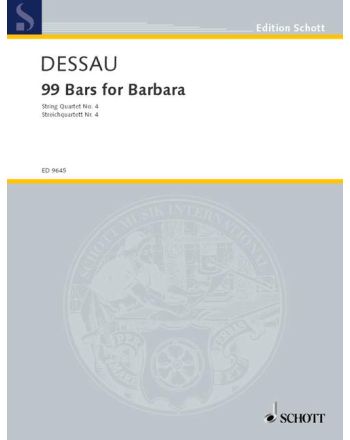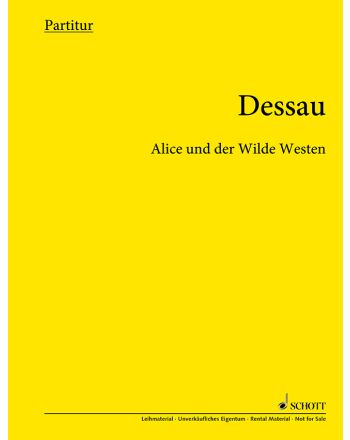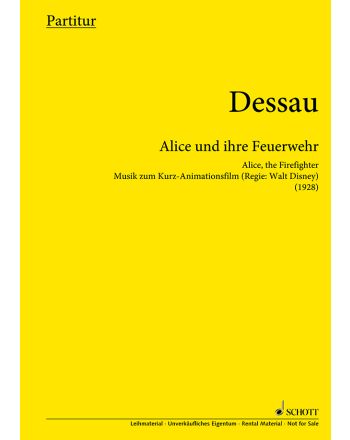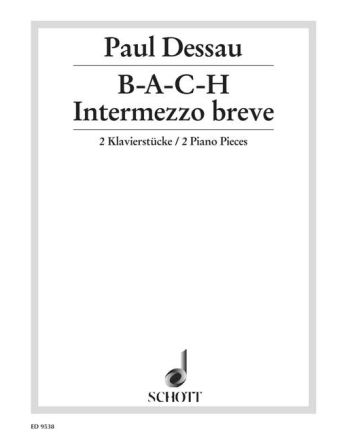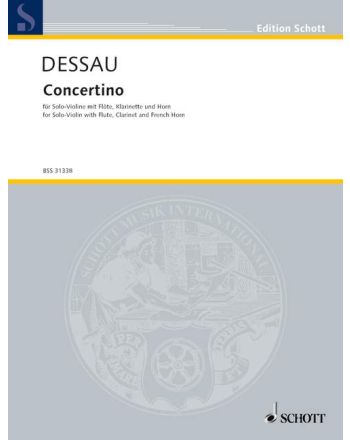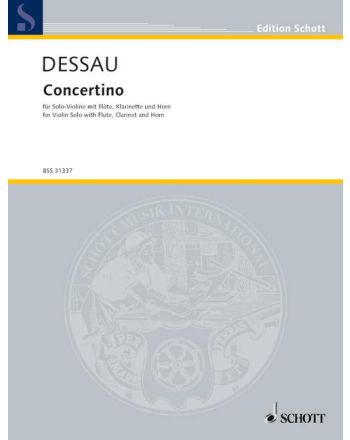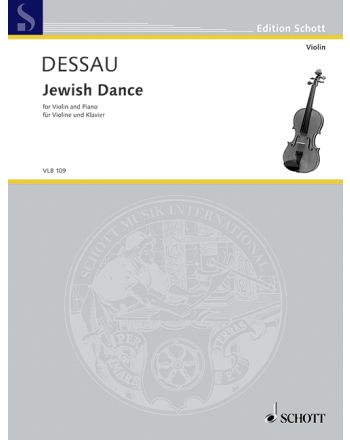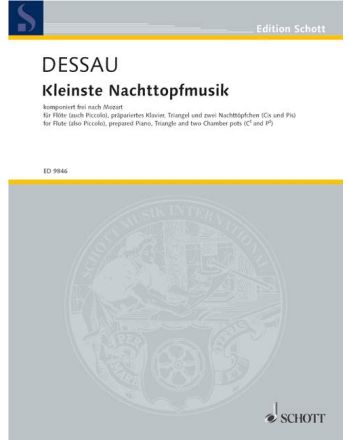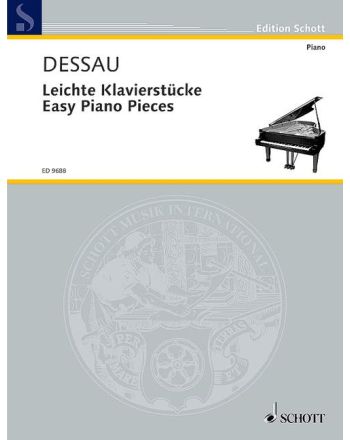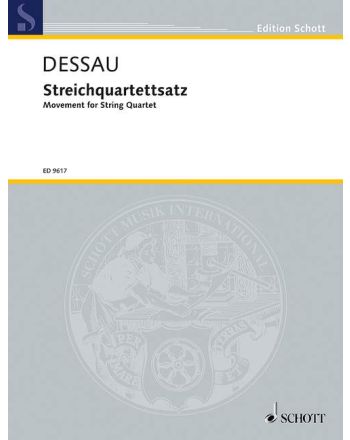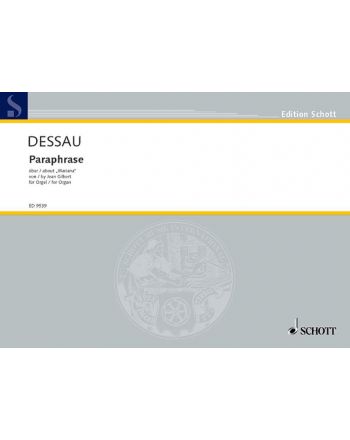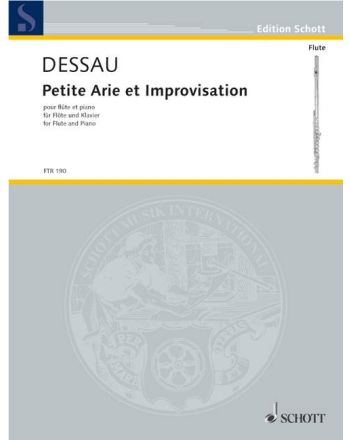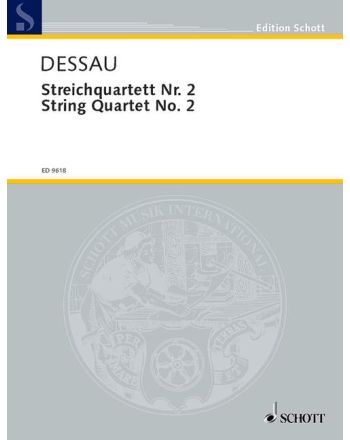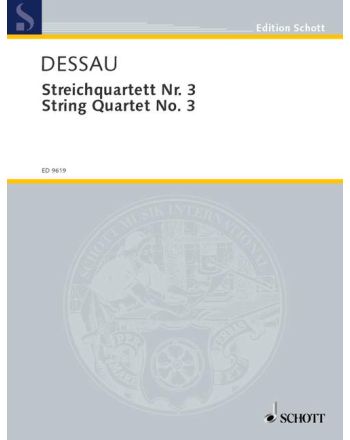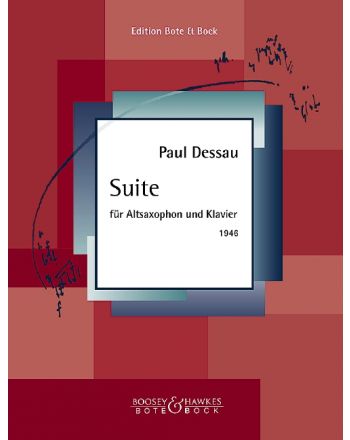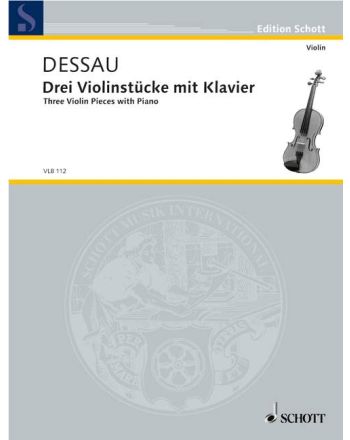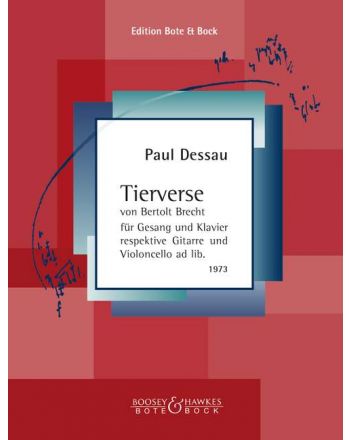
Paul Dessau
Pays d'origine:
Allemagne
Date d'anniversaire:
19 décembre 1894
Date de décès:
28 juin 1979
À propos de Paul Dessau
Paul Dessau was born in Hamburg on 19 December 1894. His grandfather was a synagogue cantor. He first took up violin lessons at the age of 6, and from 1910 to 1912 he attended the Klindworth-Scharwenka Conservatory. Afterwards he chose conducting as his career and in 1912 he started at the Hamburg City Theatre as a vocal coach. From 1919, among other theatre engagements, he was engaged by Otto Klemperer at the Cologne Opera, and later moved to the City Opera in Berlin under Bruno Walter.
Meanwhile his composing career also produced an abundance of works. Soon he was attracted by the new medium, film, and started a prominent career as music director at various film theatres. During this period, he strove to bring new music and sound techniques into film. His first experiment in sound movies, Episode, entered the 1929 Baden-Baden festival, where he had met Bertolt Brecht for the first time two years before. While his major output was film music, there were also concert pieces as well as works for proletarian children's choirs.
In 1933 he emigrated to Paris, earning a living by composing music for other émigré film directors from Germany. In 1936, he met René Leibowitz and started to study the 12-tone system. As the Spanish Civil War broke out, he composed such political marching songs as Thälmannkolonne to the text by his wife Gudrun Kabisch (both under pseudonyms). This exile period also saw his attempts in compositions with Jewish themes as he struggled to find the root of his religious background. In 1938 he composed music for the Paris performance of the Brecht play Fear and Misery in the Third Reich (then titled 99%) which was directed by Slatan Dudow.
The next year he moved to New York. In 1943, Dessau met Brecht again on the occasion of an anti-Nazi concert where his 1936 song Kampflied der schwarzen Strohhüte was included on the program. In October 1943, he moved to Hollywood. In addition to close contact with Arnold Schönberg, he mainly composed or arranged orchestration for movie studios. A new phase began in his career as he again collaborated with Brecht in various projects. He was now more committed to political causes, which led to his joining of the US Communist Party in 1946.
In 1948, he returned to Germany. In 1951 his music for the opera Das Verhör des Lukullus (The Questioning of Lukullus) was charged following the Berlin premiere with formalism when socialist realism was held as the official principle in the GDR. After close discussions with Brecht, and after changing parts of the scripts, especially the final scene and subsequently, the title into Die Verurteilung des Lukullus (The Trial of Lukullus) to avoid misinterpretation, the newly revised opera received its official Berlin premiere in October of the same year. Then, it was not performed until 1960.
In 1952 Dessau was elected member of the Akademie der Künste and was now enthusiastically involved in music education for school-age children. The next major project in theatre The Caucasian Chalk Circle began in 1953 as Brecht finally settled on Dessau as the composer. After the premiere of this latest play in October 1954, he moved to Zeuthen in the suburb of Berlin. There he would live until his death.
The untimely death of Brecht in August 1956 also affected Dessau's career as he sought to find other lyricists who were compatible with his aesthetic views. Dessau now once again turned to the 12-tone system as his major vehicle, attracting young admirers in the avant-garde movement such as Luigi Nono, while he continued to put his ideas of music education in a socialist state into practice as he taught at the Zeuthener Grundschule. The result of the latter effort would be published in "Musikarbeit in der Schule". During the new phase, he also completed two operas which were based on Brecht's ideas. Puntila was premiered in 1966, and Einstein, 1974.
Paul Dessau died in Königs-Wusterhausen near Berlin on 28 June 1979.
Meanwhile his composing career also produced an abundance of works. Soon he was attracted by the new medium, film, and started a prominent career as music director at various film theatres. During this period, he strove to bring new music and sound techniques into film. His first experiment in sound movies, Episode, entered the 1929 Baden-Baden festival, where he had met Bertolt Brecht for the first time two years before. While his major output was film music, there were also concert pieces as well as works for proletarian children's choirs.
In 1933 he emigrated to Paris, earning a living by composing music for other émigré film directors from Germany. In 1936, he met René Leibowitz and started to study the 12-tone system. As the Spanish Civil War broke out, he composed such political marching songs as Thälmannkolonne to the text by his wife Gudrun Kabisch (both under pseudonyms). This exile period also saw his attempts in compositions with Jewish themes as he struggled to find the root of his religious background. In 1938 he composed music for the Paris performance of the Brecht play Fear and Misery in the Third Reich (then titled 99%) which was directed by Slatan Dudow.
The next year he moved to New York. In 1943, Dessau met Brecht again on the occasion of an anti-Nazi concert where his 1936 song Kampflied der schwarzen Strohhüte was included on the program. In October 1943, he moved to Hollywood. In addition to close contact with Arnold Schönberg, he mainly composed or arranged orchestration for movie studios. A new phase began in his career as he again collaborated with Brecht in various projects. He was now more committed to political causes, which led to his joining of the US Communist Party in 1946.
In 1948, he returned to Germany. In 1951 his music for the opera Das Verhör des Lukullus (The Questioning of Lukullus) was charged following the Berlin premiere with formalism when socialist realism was held as the official principle in the GDR. After close discussions with Brecht, and after changing parts of the scripts, especially the final scene and subsequently, the title into Die Verurteilung des Lukullus (The Trial of Lukullus) to avoid misinterpretation, the newly revised opera received its official Berlin premiere in October of the same year. Then, it was not performed until 1960.
In 1952 Dessau was elected member of the Akademie der Künste and was now enthusiastically involved in music education for school-age children. The next major project in theatre The Caucasian Chalk Circle began in 1953 as Brecht finally settled on Dessau as the composer. After the premiere of this latest play in October 1954, he moved to Zeuthen in the suburb of Berlin. There he would live until his death.
The untimely death of Brecht in August 1956 also affected Dessau's career as he sought to find other lyricists who were compatible with his aesthetic views. Dessau now once again turned to the 12-tone system as his major vehicle, attracting young admirers in the avant-garde movement such as Luigi Nono, while he continued to put his ideas of music education in a socialist state into practice as he taught at the Zeuthener Grundschule. The result of the latter effort would be published in "Musikarbeit in der Schule". During the new phase, he also completed two operas which were based on Brecht's ideas. Puntila was premiered in 1966, and Einstein, 1974.
Paul Dessau died in Königs-Wusterhausen near Berlin on 28 June 1979.
Liste d'œuvres
Produits
-
String Quartet No. 4, with a Viola Solo for the "new instrument"Compositeur: Paul DessauEdition: Partition et partiesSérie: Edition Schott
Numéro du produit: ED 9645Type de produitEn stockPrix à partir de 13,99 €TTC -
Music to the short animated movie (Direction: Walt Disney)Compositeur: Paul DessauMedia Type: Matériel en location / d'exécutionEdition: Matériel d'exécutionInstrumentation: orchestre de chambreMatériel en location / d'exécutionMatériel en location / d'exécution
-
Music to the short animated movie (Direction: Walt Disney)Compositeur: Paul DessauMedia Type: Matériel en location / d'exécutionEdition: Matériel d'exécutionInstrumentation: orchestre de chambreMatériel en location / d'exécutionMatériel en location / d'exécution
-
Musik zum Kurz-Animationsfilm (Regie: Walt Disney)Compositeur: Paul DessauMedia Type: Matériel en location / d'exécutionEdition: Matériel d'exécutionInstrumentation: orchestre de chambreMatériel en location / d'exécutionMatériel en location / d'exécution
-
Music to the short animated movie (Direction: Walt Disney)Compositeur: Paul DessauMedia Type: Matériel en location / d'exécutionEdition: Matériel d'exécutionInstrumentation: orchestre de chambreMatériel en location / d'exécutionMatériel en location / d'exécution
-
Two Piano PiecesType de produitEn stockPrix à partir de 8,99 €TTC
-
nach dem Gedicht "Die Freunde" von Bertolt BrechtCompositeur: Paul DessauMedia Type: PartitionEdition: PartitionInstrumentation: chant, flûte, quatuor à cordes ou chant et piano ad lib.Langue: AllemandNuméro du produit: BB 5100140Format papierFormat papierEn stock9,00 €TTC, hors expédition
-
for violin solo with flute, clarient and hornCompositeur: Paul DessauEdition: Jeu de partiesSéries: Edition Schott
Concertino
Numéro du produit: BSS 31338Type de produitEn stockPrix à partir de 46,99 €TTC -
for violin solo with flute, clarient and hornCompositeur: Paul DessauEdition: PartitionSéries: Edition Schott
Concertino
Instrumentation: violon seul avec flûte, clarinette et corNuméro du produit: BSS 31337Type de produitEn stockPrix à partir de 14,99 €TTC -
pour chant et ensembleCompositeur: Paul DessauMedia Type: Matériel en location / d'exécutionEdition: Matériel d'exécutionLangue: VocalisesMatériel en location / d'exécutionMatériel en location / d'exécution
-
Compositeur: Paul DessauMedia Type: PartitionEdition: Partition de choeurInstrumentation: solistes, choeur d'enfants, 2 violons et pianoLangue: AllemandNuméro du produit: BB 5500228Format papierFormat papierEn stock3,25 €TTC, hors expédition
-
Compositeur: Paul DessauMedia Type: PartitionEdition: Partition de direction (également pour les exécutants)Instrumentation: solistes, choeur d'enfants, 2 violons et pianoLangue: AllemandNuméro du produit: BB 5401158Format papierFormat papierEn stock12,00 €TTC, hors expédition
-
Musik zum Puppenfilm mit Realfilmelementen (Regie: Ladislas Starevich)Compositeur: Paul DessauMedia Type: Matériel en location / d'exécutionEdition: Matériel d'exécutionInstrumentation: orchestre de chambreMatériel en location / d'exécutionMatériel en location / d'exécution
-
Oper in zwölf SzenenCompositeur: Paul DessauMedia Type: Matériel en location / d'exécutionEdition: Matériel d'exécutionLangue: AllemandMatériel en location / d'exécutionMatériel en location / d'exécution
-
für Sopran, Alt und OrchesterCompositeur: Paul DessauMedia Type: Matériel en location / d'exécutionEdition: Matériel d'exécutionLangue: FrançaisMatériel en location / d'exécutionMatériel en location / d'exécution
-
Format papierFormat papierEn stock14,00 €TTC, hors expédition
-
Format papierFormat papierEn stock7,50 €TTC, hors expédition
-
Format papierFormat papierEn stock9,00 €TTC, hors expédition
-
5 Canons aus dem 'Musikalischen Opfer' von Johann Sebastian Bach (BWV 1079)Compositeur: Paul DessauMedia Type: Matériel en location / d'exécutionEdition: Matériel d'exécutionMatériel en location / d'exécutionMatériel en location / d'exécution
-
Compositeur: Paul DessauSéries: Edition Schott
Violin Library
Instrumentation: violon et pianoNuméro du produit: VLB 109Type de produitEn stockPrix à partir de 15,99 €TTC -
Petite musique dans le style de MozartCompositeur: Paul DessauEdition: Partition et partiesSérie: Edition Schott
Instrumentation: flûte (aussi Piccolo), piano, triangles et 2 Nachttöpfchen (Cis et Pis)Numéro du produit: ED 9846Type de produitEn stockPrix à partir de 13,99 €TTC -
Type de produitEn stockPrix à partir de 7,99 €TTC
-
Compositeur: Paul DessauEdition: Partition et partiesSérie: Edition Schott
Instrumentation: quatuor à cordesNuméro du produit: ED 9617Type de produitEn stockPrix à partir de 13,99 €TTC -
for 15 string instrumentsCompositeur: Paul DessauMedia Type: PartitionEdition: PartitionInstrumentation: orchestre à cordesNuméro du produit: BB 6400943Format papierFormat papierEn stock24,00 €TTC, hors expédition
-
about "Mariana” by Jean GilbertCompositeur: Paul DessauMedia Type: PartitionSérie: Edition Schott
Instrumentation: orgueNuméro du produit: ED 9539Format papierFormat papierEn stock13,00 €TTC, hors expédition -
Compositeur: Paul DessauSéries: Il Flauto traverso
Edition Schott
Instrumentation: flûte et pianoNuméro du produit: FTR 190Type de produitEn stockPrix à partir de 9,99 €TTC -
Oper in 13 scenes and an epilogue by Bertolt BrechtCompositeur: Paul DessauArrangeur: Peter Palitzsch | Manfred WekwerthMedia Type: PartitionEdition: Réduction pour pianoLangue: AllemandNuméro du produit: BB 6600137Format papierFormat papierEn stock51,50 €TTC, hors expédition
-
Compositeur: Paul DessauMedia Type: PartitionEdition: Partition d'étudeInstrumentation: 4 violoncelles, 2 pianos et 2 batteriesNuméro du produit: BB 6501209Format papierFormat papierEn stock9,00 €TTC, hors expédition
-
Compositeur: Paul DessauEdition: Partition et partiesSérie: Edition Schott
Instrumentation: quatuor à cordesNuméro du produit: ED 9618Type de produitEn stockPrix à partir de 38,99 €TTC -
Compositeur: Paul DessauMedia Type: PartitionEdition: Partition et partiesInstrumentation: hautbois, clarinette, basson, cor et pianoNuméro du produit: BB 4400326Format papierFormat papierEn stock37,50 €TTC, hors expédition
-
Format papierFormat papierEn stock11,00 €TTC, hors expédition
-
Compositeur: Paul DessauEdition: Partition et partiesSérie: Edition Schott
Instrumentation: quatuor à cordesNuméro du produit: ED 9619Type de produitEn stockPrix à partir de 24,99 €TTC -
Compositeur: Paul DessauMedia Type: PartitionEdition: Jeu de partiesInstrumentation: quatuor à cordesNuméro du produit: BB 1400498Format papierFormat papierEn stock32,00 €TTC, hors expédition
-
Compositeur: Paul DessauMedia Type: PartitionInstrumentation: saxophone alto et pianoNuméro du produit: BB 2400178Format papierFormat papierEn stock14,00 €TTC, hors expédition
-
Fairy Tale Suite in 5 Movements for Small OrchestraCompositeur: Paul DessauMedia Type: Matériel en location / d'exécutionEdition: Matériel d'exécutionMatériel en location / d'exécutionMatériel en location / d'exécution
-
Musik zum Puppenfilm mit Realfilmelementen (Regie: Ladislas Starevich)Compositeur: Paul DessauMedia Type: Matériel en location / d'exécutionEdition: Matériel d'exécutionInstrumentation: orchestreMatériel en location / d'exécutionMatériel en location / d'exécution
-
Compositeur: Paul DessauSéries: Edition Schott
Violin Library
Instrumentation: violon et pianoNuméro du produit: VLB 112Type de produitEn stockPrix à partir de 15,99 €TTC -
von Bertolt BrechtCompositeur: Paul DessauMedia Type: PartitionInstrumentation: Gesang und (präpariertes) Klavier respektive Gitarre (Violoncello ad libitum)Langue: AllemandNuméro du produit: BB 5100117Format papierFormat papierEn stock12,00 €TTC, hors expédition

